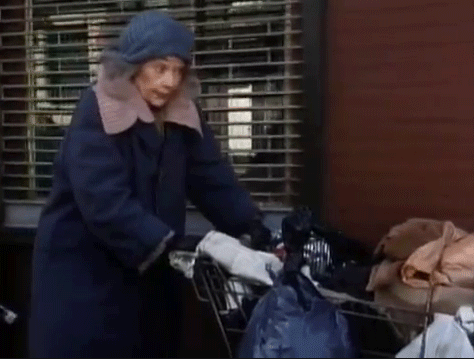Lucille Ball never quite got the accolades she deserved for switching to drama in the 1985 TV movie, Stone Pillow. Directed by George Schaefer, the screenplay expectedly veers toward the side of maudlin, with Ball as the sole entity to save the movie from coming across as a PSA. In an iconic introductory scene not quite made iconic enough by how unknown it is, Florabelle (Ball) emerges from a trash bag, looks around glumly and notes, “Well, I’m still here.” It is easily the most relatable scene for anyone who has managed to find themselves continuing to live in New York past the age of forty–homeless or not. And, if you’re like Flora (the diminutive she goes by), chances are you will have encountered certain circumstances while living in the city that possess a strong likelihood of making you have a breakdown.
In Flora’s case, she wasn’t always a city rat. She lived “on a farm” with her husband and son, both named–tritely enough–Sonny. After Sonny Jr. gets sick, it makes Flora sick with worry–enough for her to be put into a hospital. Between the medical and emotional expenses, the two abandon her one day on the whim of her husband while she’s still recovering in the hospital. Upon returning to find them gone, she goes a bit off the deep end, finding herself incapable of anything other than survival on the streets after working in “war plants” and “cleaning houses” for awhile. She has learned that to trust in people is to set oneself up for failure, disappointment and insanity. This is precisely why she brings out her proverbial claws when she sees an ingenue of a social worker named Carrie (Daphne Zuniga, best known for her star turn in The Sure Thing) take a piece of bread she was eyeing from the trash can to feed to the pigeons. Carrie, who was instructed to go out onto the streets by her superior so that she can shake off some of the overt naïveté emanating from her very core, is startled by Flora’s outburst, offering her money as a consolation. Flora balks at the notion, and then interprets her innocence and oblivion to the realities of the street to mean she’s a runaway. This doesn’t prevent her from leaving Carrie behind to continue in her lonerism.
Because of Flora’s advanced age, people often take pity on her, including a quintessential 80s businessman who offers to buy her a coffee when she tells him that even if he gives her money, no one would let her into their establishment. As he goes into what may or may not be a Dunkin’ Donuts, Flora feels the need to go to the bathroom, taking her prized possession–a shopping cart filled with a lot of nondescript bric-a-brac–along to go to a darkened alley with some toilet paper. At that moment, another tough ass homeless bitch seizes the opportunity to steal the cart. Luckily, Carrie had followed Flora in her earnest attempt to understand the life of a vagabond and protects the cart from being stolen. It is in this way that Carrie is able to secure Flora’s trust. So grateful is she, in fact, that she begins to show Carrie all the ropes for survival: which restaurants have the best dumpster food, which parts of the Port Authority are safe from cops and that a little iodine can go a long way in maintaining one’s health.
That night, when Flora finds Carrie a place to sleep and realizes that the kid really can’t hack it when Carrie announces how sick she feels, Flora leaves her friend, Max (William Converse-Roberts), to watch over her while she goes to a pharmacist who “has a crush” on her to get medicine. Max immediately regards Carrie with suspicion, intimating from her prim demeanor and non-fucked up back that she’s accustomed to sleeping in a bed. He chides, “She trusted you with her cart. Her whole world. That’s rare among the homeless.” Carrie, feeling guilty, insists that she only wants to help by better understanding the homeless. Max, an undercover lawyer (don’t question it), responds with the most agenda-laden line of the film: “Trying to know what it’s like to be down and out in the richest country in the world. 13,000 alone in New York. More every day.”
Those “more every day” are probably aging NYC women who have lost their minds from the psychological damage they’ve simultaneously endured and gotten off on. In any case, when Flora eventually learns Carrie’s true identity, she feels made a fool of, going off on a tangent after trying to find her in a shelter and then being led away on a bus to the worst place of all back in the 80s: Brooklyn. Though she tries to leave the shelter, she doesn’t know the streets away from Manhattan and suddenly seems to have the epiphany that she’s getting too old for this shit.
Carrie, wracked with guilt, searches the area near Flora’s “corner” until, after mistaking another dead woman for her, catches a glimpse of her from across the street. She begs Flora to let her help, to allow her to get her a home she can call her own. Stubborn and afraid of change, Flora resists and lets Carrie walk away. But seeing her potential fate as the dead woman being dragged away from the corner and into a coroner’s van, Flora shoves aside her pride and gives in to the help offered by Carrie. Now if only she’d left New York in the first place, she could have avoided this whole ordeal.





















